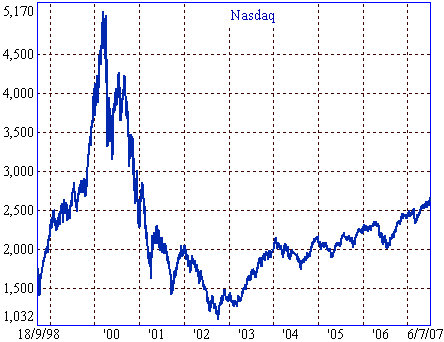Isaac Newton loses his fortune
By Murray Bourne, 08 Jul 2007
There is an increasing amount of concern about the protracted bull market in world equity markets. Since March 2003, almost every stock market has increased in value (and on average, world markets have almost doubled).
Memories of the "Dotcom Wreck" starting in 2000 are still fresh. The Nasdaq index is a good proxy for this financial disaster:

The graph shows the dramatic growth in share prices that started late in 1998. The hype about the potential of the Net was being pushed daily in all the media. "This time it’s different" was the mantra of the TV commentators.
If you had invested in 1998 (when the Nasdaq was around 1400), your money would have more than tripled by the time the Nasdaq peaked at over 5000 in March 2000.
Three years of misery followed where investors (those that hung on) lost 80% of their money (in October 2002 the Nasdaq was at around 1100.) In the following 5 years, the Nasdaq has more than doubled.
South Sea Bubble
Flashback to the early 1700s. England was in a spot of bother having sent itself broke fighting a war involving the French, Spanish and money. The government approached the South Sea Company to help them out, and put conditions in place to attract investors. People always want to make a quick buck, and the investors enthusiastically invested - in droves. From the story in stockmarketcrash.net (link no longer available):
Speculation became rampant as the share price kept skyrocketing. It was thought that this company “could never fail”.
One of the main money-making ventures of the South Sea Company was trading African slaves for the Americans.
Isaac Newton
Even Isaac Newton got caught up in the South Sea mania and invested a big chunk of his fortune. Interestingly, he pulled out early (after making a respectable 7000 pounds) then went back in after the bubble continued to inflate. The inevitable bust happened and he lost 20,000 pounds - a considerable sum at the time.
As a result of this crisis, he stated “I can calculate the motions of heavenly bodies, but not the madness of people”.
Footnote 1: Some of the Dotcom mania was well founded. Google, YouTube, Yahoo and others have gone on to develop highly successful Web-based businesses, worth billions. The problem in the late 1990s was that investors were happy to fund companies with no business plan and no hope of profits. The "madness of people" indeed.
Footnote 2: I don’t wish to imply that investing in stocks is dangerous - quite the opposite. If you don’t invest, you are setting yourself up for later poverty. But what you need to do is be careful to avoid hype and to be able to spot a bubble.
Footnote 3: For another speculative bubble (involving Japanese real estate), see Math of House Buying.
See the 1 Comment below.

8 Oct 2011 at 12:51 am [Comment permalink]
[...] genius also lost money in the stock market, so can we. [...]